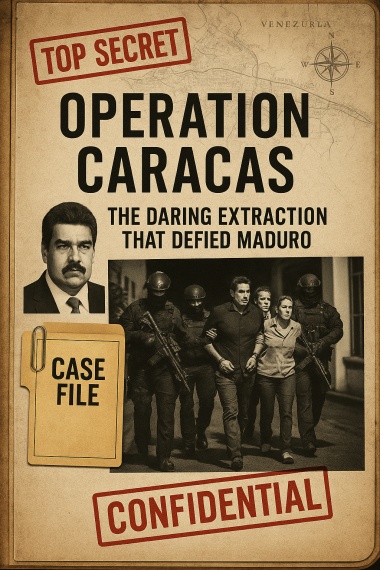Read, Comment and Share –
By José Roberto de Souza Dias – Two Flags Post
It could have been a James Bond script — but it was real. In a bold, high-stakes operation that unfolded like an international thriller, five Venezuelan opposition members were extracted from the Argentine Embassy in Caracas and taken to the United States after 15 months in diplomatic limbo. While the public remained unaware, the scene behind the curtain was tense and explosive. And Brazil, albeit unwittingly, was part of the set.
The five individuals, close allies of opposition leader María Corina Machado, had taken refuge in the Argentine ambassador’s residence in March 2024 after arrest warrants were issued against them by Nicolás Maduro’s regime for alleged conspiracy. For over a year, they lived under surveillance, power outages, and the constant threat of political persecution. When Argentina severed diplomatic ties with Venezuela, Brazil assumed custody of the embassy — and thus, responsibility for the political asylees. But according to CNN Brasil, the Brazilian government was not informed in advance about the extraction mission.
The operation itself was silent, swift, and stunning. With Maduro conveniently visiting Russia, a coordinated effort involving U.S. intelligence and Argentine cooperation ensured the safe relocation of the five dissidents to American soil. Senator Marco Rubio — one of the strongest voices in U.S. foreign policy — described it as a “precise operation,” keeping all tactical details under wraps.
Argentine President Javier Milei publicly thanked the United States, calling the rescue a “non-negotiable commitment to freedom.” Machado hailed the mission as “impeccable and epic,” underscoring the power of courage and international solidarity against authoritarianism.
Leading outlets such as CBS News, The Times (UK), and Reuters confirmed the mission’s success and the dissidents’ arrival in the U.S. Caracas remained silent — a silence that spoke volumes.
Beyond the drama, however, the operation raises serious concerns for democratic countries, including Brazil. As Reutershighlighted, international analysts see the mission as a clear signal that the U.S. is willing to act directly to protect political opponents of authoritarian regimes. Moreover, it may influence the global protocols for dissident protection and diplomatic asylum.
It also casts a shadow over Brazil’s posture. As guardian of the embassy and those inside it, Brazil’s uninformed role hints at weakness, not neutrality. Silence is no longer just prudence — it can be complicity.
Now safe on American soil, the five dissidents begin new lives. Maduro, back in Caracas, faces a regime still intact but clearly challenged. And across the international stage, a new script is being written — one where freedom moves in silence, backed not just by declarations but by daring action.
The name of the game? Strategy. The face of it? Liberty. The plot? Stranger than fiction. But it happened.


